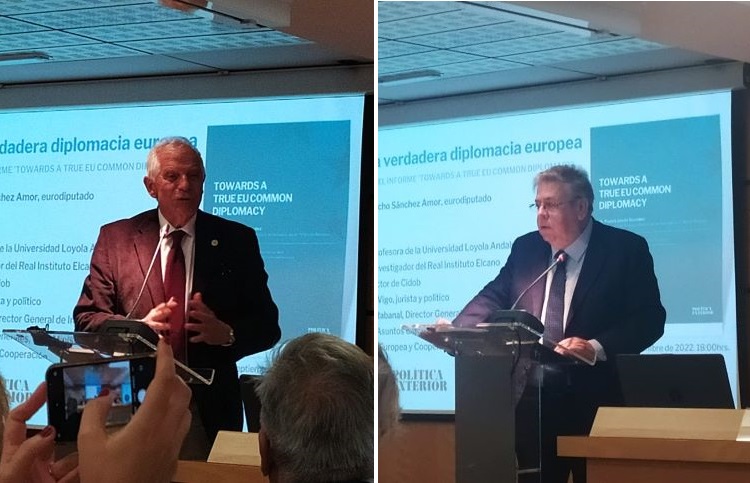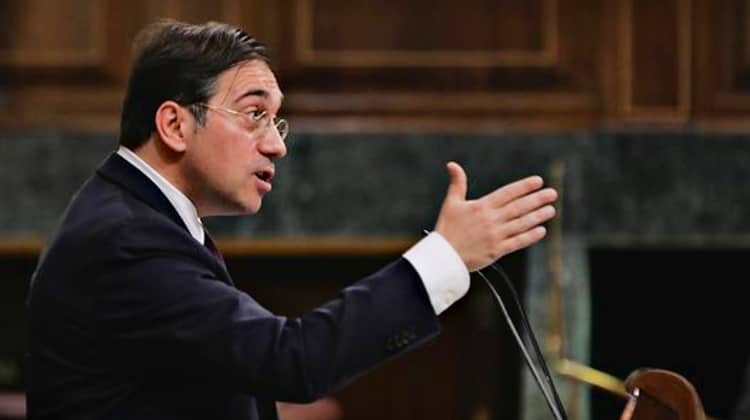Eduardo González
The EU’s High Representative for Common Foreign and Security Policy, Josep Borrell, defended yesterday in Madrid the implementation of a “true European diplomacy” that contributes to “communitarize the foreign policy” of the 27.
“We certainly do not have a true European diplomacy,” Borrell declared during the presentation of the report entitled, precisely, Towards a EU True Common Diplomacy, which took place at the European Parliament Office in Madrid. The report, commissioned by Spanish Socialist MEP Ignacio Sánchez Amor and prepared by researchers Paula Lamoso, Ignacio Molina and Pol Morillas, analyzes the architecture of the Union’s diplomacy and makes a series of recommendations to improve it, with special attention to the creation of its own autonomous European instruments in foreign and security policy.
“We have a European External Action Service (EEAS), diplomatic representations in more than 150 countries and almost 5,000 people working in the EEAS, which is no mean feat,” but foreign policy remains “the competence of the states,” he continued. For this reason, he warned, it is necessary to face “more ambitious objectives” in order to “communitize European foreign policy by means of a common foreign policy, which is not the only one”, he affirmed.
To this end, Borrell explained, it is necessary to “move towards a true European diplomacy” based on “two foundations”: human resources and the creation of a “European strategic culture”. Regarding the first, the high representative announced that “in a few days” he himself will inaugurate “the first course of the European Diplomatic School”, which, although “it is not exactly a Diplomatic School, it is an embryo” to get “full-time diplomats” and stop depending on the diplomatic corps of the States. Regarding the second objective, Borrell warned that “Europe must share a common strategic vision of the world, a strategic culture”, because “without this strategic vision of the world it is very difficult to have a common foreign policy”.
To date, Borrell explained, the EU has moved forward as crises have forced it to do so. “The current crisis (in Ukraine) has two positive consequences: breaking the taboo that the EU cannot mobilize common resources to arm a country at war, which has been done, and freeing us from Russian energy dependence, which was a major constraint on our foreign policy.” “We are very much conditioned by energy dependence and we will be able to move towards strategic autonomy because we will no longer have that dependence,” he concluded.
Sánchez Amor: “Too many egos in European foreign policy”
For his part, Ignacio Sánchez Amor explained during the event that, in order to move forward with a real foreign policy, the EU faces major obstacles, including “a weak, vague legal framework from which anything can come out.” “There are too many faces and too many egos in European foreign policy, with a president of the Council, a president of the Commission and a high representative,” he lamented. “The childish competition between the Council president and the Commission president over who shows up greeting whom or who sits in the highest chair” confuses “friends and partners,” who do not know which of the “three phones” they should call to address foreign policy issues with the EU.
For this reason, he warned, “the high representative should be left to work, because that is what he has been elected for.” “He is not a foreign minister chosen by the president of the Commission, he was chosen in the summer of 2019 at the same time as the presidents of the Council and the Commission, the high representative came with the package”, and, therefore, “the hyperactivity of the two presidents is detrimental” to European external action.
As for the instruments needed to tackle a European foreign policy, included in the report, Sanchez Amor advocated the creation of a “European intelligence” because “in external crises we cannot go around the world blindly or with information that is graciously granted to us by national intelligence”. To this end, a greater “flow of information” should be favored because “in the face of an external crisis”, such as the recent ones in Afghanistan or Ukraine, “the EEAS should know as much as the Member State which knows the most”.
Another important instrument would be the creation of “a European Diplomatic School” which would make it possible to set up “a true European diplomacy at its roots, selected and trained expressly for that purpose”. In this regard, the MEP recalled that the European Parliament approved in 2021 a pilot project endowed with two million euros (one million in 2022 and another in 2023) to explore, precisely, the idea of a Diplomatic School.
The third major challenge for the EU, the MEP concluded, is the insertion of the EU into the multilateral system. “The UN is designed for states, but new international subjects have appeared that also make foreign policy without being states,” he said. “The UN has a problem: there is no seat for the EU in the Security Council,” he warned. To overcome that problem, he explained, there are two alternatives: to reform and enlarge the Council or “to increase shared responsibilities based on the French seat (France is a permanent member).” Therefore, he said, it would be interesting to see whether, in twelve to fourteen years’ time, France would agree to convert its “French seat into a European seat”, which, he admitted rather ironically, “would test the sincerity of France’s grand Europeanist and high-sounding discourse”.






